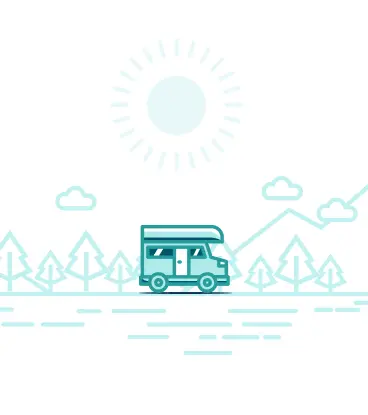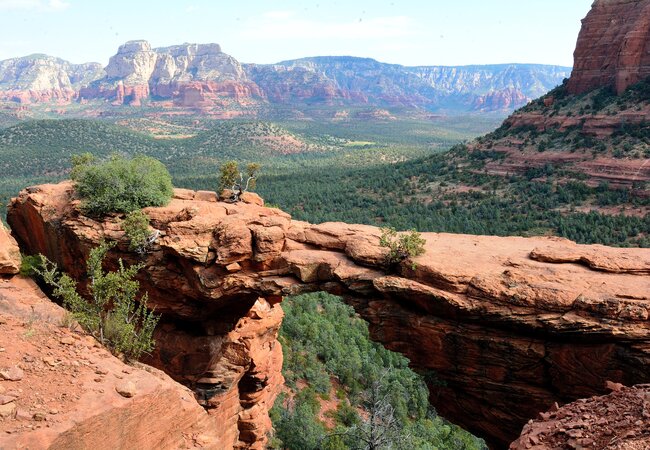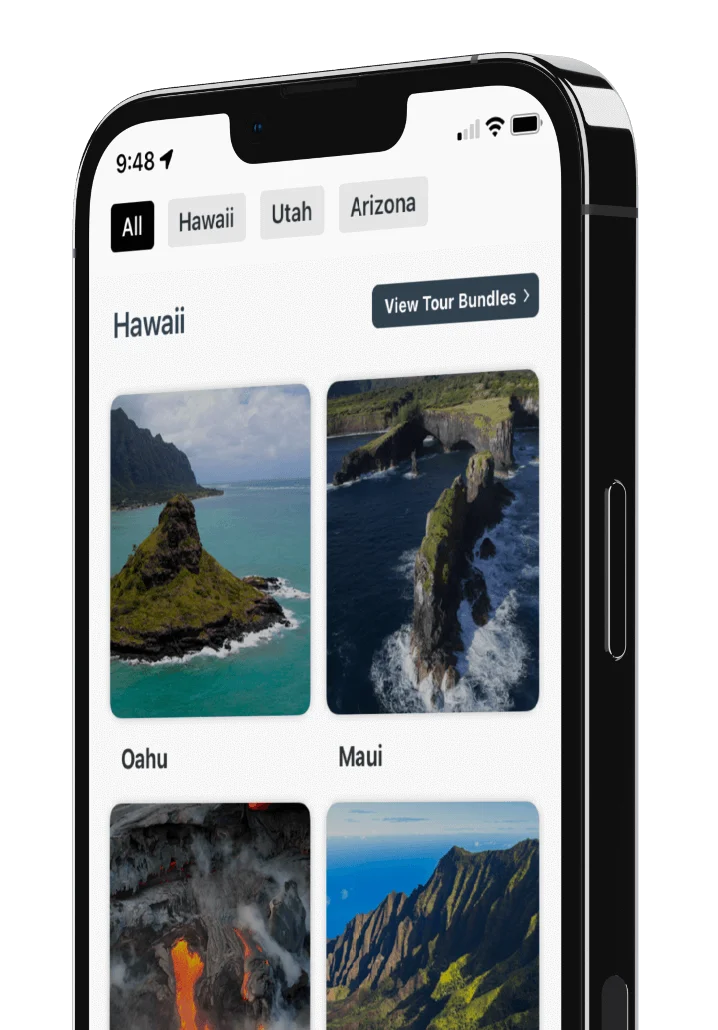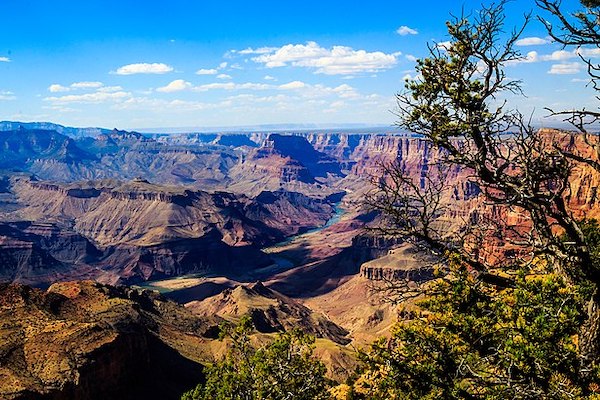
Grand Canyon, North vs South Rim: Everything You Need to Know

Visiting the Grand Canyon is the experience of a lifetime. If you've done your homework, you'll know that the Grand Canyon is massive, spanning three states and 277 miles!
However, what a lot of visitors don’t know is that the Grand Canyon is divided into four distinct regions and rims, each with their own unique charm, hikes, and environments! Once you mark your vacation days in your calendar, you’ve got a decision to make: which rim is right for you?
Which Rim is Which
With four rims to look at, it can all get a bit confusing. The north, south, and west rims are where visitors can see the Grand Canyon in all its glory, while the unofficially named “east” rim does not overlook the Grand Canyon.
What people call the East Rim is generally a mix of sites that includes the famous Horseshoe Bend and Antelope Canyon. Some of these are held by the federal government and others by the Navajo nation. To learn more about the “East Rim,” check out our travel guide.
The north and south rims are federally operated while the west rim is privately owned by the Hualapai people. This guide will focus on comparing the north and south rims that make up the famous Grand Canyon National Park.
Where are the North and South Rims
While the distance between the north and south rims is only about 20 miles, traveling from rim to rim will require a 5-hour drive, a shuttle, or a full day of backpacking. Most people will only visit one rim during their trip. Both of the rims are located in northern Arizona.
Tip: Want to visit both? No worries! To learn more about how to hike from rim to rim, check out our rim-to-rim guide.
North vs South Rim
Though both the North and South Rims provide spectacular views of the canyon, the two sections of the park couldn’t be more different from one another. The north rim is all about solitude and peace in nature, while the south rim is full of amenities and family-friendly activities.
All About the North Rim
Nearby Towns - Time and Driving Distance
Page, AZ - 2:00, 107 miles
Jacob Lake, AZ - 35 min, 31 miles
Fredonia, AZ - 1:05, 61 miles
Kanab, AZ - 1:15, 67 miles
Nearby Parks and Side-Trips
Vermillion Cliffs National Monument- 50 min, 42 miles
Zion National Park - 1:45, 95 miles
Coral Pink Sand Dunes State Park - 1:30, 80 miles
East Rim’s Horseshoe Bend - 1:55, 105 miles
Bryce Canyon National Park - 2:40, 144 miles
Escalante National Monument (Interagency Center) - 3:25, 187 miles
Weather and Environment
Because the North Rim is more than 8,000 feet (2,438 meters) above sea level, it is several degrees cooler than the South Rim, which is about 1,000 feet lower. Snow and evening freezes can last well into mid-June.
You’ll also notice that the North Rim is significantly greener and shadier than the south and is covered by thick Ponderosa pine forests. It also rains slightly more on the north than on the south. Be prepared for high-altitude weather variability and dress for cooler weather or in layers.
Opening Season
Due to heavy snowfall, the North Rim is closed from October 15th to May 15th.
Attractions
Some attractions near and on the North Rim include:
- East Rim, Bitter Springs, and Navajo Bridge - A Navajo Village and footbridge overlooking the Colorado River and the Grand Canyon.
- Antelope Canyon - A famous slot canyon named for the antelope that used to frequent the area. Today it’s a natural wonder on every photographer’s bucket list.
- Pipe Springs National Monument - A historic Mormon town turned monument featuring a museum and interpretive trail.
- Kanab - This town is home to the Coral Pink Sand Dunes State Park, the Little Hollywood Museum, the famous Coyote Buttes, and other attractions.
- Town of Jacob’s Lake - The town of Jacob Lake is the gateway to the Kaibab National Forest, a 1.6 million acre forest open to fishing, hiking, and camping. Visit the Kaibab Plateau Visitor Center for more information. Jacob’s Lake is also the closest lodging to be found outside the park. Be sure to stop by Jacob’s Lake Inn for one of their famous cookies and the historic 1934 Civilian Conservation Corps Firetower.
- Cape Royal Road - This scenic road connects to Point Imperial Road (see below) as well as four other viewpoints and a picnic area.
- Point Imperial Road - Inside the North Rim park we’ll find the scenic Point Imperial Road. This road leads to the highest vantage point on the North Rim, as well as the North Point Trail and picnic area.
Best Trails
The North Rim has a plethora of fantastic hiking trails to choose from, ranging in difficulty from beginner to expert. Some of the more popular day hikes include the Point Sublime Trail, Cape Final Trail, Roosevelt Point Trail, Uncle Jim Trail, and the North Kaibab Trail. Check out our North Rim itinerary and hiking guide for more information.
Best Views and Photography
There’s one big plus to taking photos on the North Rim—no photobombs! In fact, you’re more likely to get an unexpected condor in your picture than a tourist. The views from the North Rim are beautiful and panoramic, but because the North Rim is higher in elevation, you see less of the opposite rim. This means the view is more aerial but less immersive. Some of the North Rim’s most popular viewpoints are Point Imperial, Roosevelt Point, Cape Royal, and Bright Angel Point.
Camping
For RV camping inside the park, you have only one option: the North Rim Campground. Fortunately, it’s a great one. It’s scenic, shady, and full of amenities. There are several more camping options outside the park. The NPS website will have the most up-to-date information on campground availability.
Special considerations: Some places on the North Rim, such as Cape Final, require either a hike or a 4WD vehicle. If you’d like to take some of these roads-less-traveled, consider renting one for your trip to the North Rim.
All About the South Rim
Nearby Towns- Time and Driving Distance
Tusayan, AZ - 8 min, 4 miles
Cameron, AZ - 30 min, 30 miles
Williams, AZ - 55 min, 54 miles
Tuba City, AZ - 55 min, 55 miles
Flagstaff, AZ - 1:15, 75 miles
Nearby Parks and Side-Trips
Wupatki National Monument - 50 min, 51 miles
Sunset Crater National Monument - 1:04, 68 miles
Walnut Canyon National Monument- 1:22, 84 miles
Slide Rock State Park- 1:54, 104 miles
Montezuma Castle National Monument-2:06, 135 miles
Sedona, AZ- 2:07, 111 miles (Going to Sedona? Check out our Shaka Guide Sedona tour.)
Petrified National Park- 2:50, 184 miles
Weather and Environment
The South Rim is about 1,000 feet (305 meters) lower in elevation than the North Rim, with an average elevation of around 7,000 feet. Even in summer, mornings and nights can be cool, but the south rim heats up quickly and temperatures can quickly soar above 100 degrees Fahrenheit.
The heat can be especially dangerous if you plan on going below the rim into the canyon. The canyon bottom may be around 20 degrees Fahrenheit (7 degrees Celsius) warmer than the top. Expect a lot of direct sun exposure because the south rim is much more barren and open than the north.
Opening Season
The South Rim is open year-round, although select services and restaurants may close during the off-season. Check the NPS page for more information.
Attractions
Some attractions near and on the South Rim include:
- Williams, AZ and historic Route 66 - Get your kicks on route 66! This walkable town has a vintage vibe with many diners, gift shops, a wildlife park, and the famous Grand Canyon Railway!
- Grand Canyon Railway - Need a lift? Follow the original path visitors took to the South Rim for decades by hopping aboard the Grand Canyon Railway!
- Kaibab National Forest - Just as in the North Rim, this bisected forest offers plenty of activities and camping options for visitors.
- Bedrock City/Raptor Ranch - Kids ready for a break from rocks? How about some dinos and real live wild animals? This wildlife center offers tours to families and is sure to engage even the most discriminating of kids.
- Tusayan and the Grand Canyon Visitor Center - Tusayan town is located just minutes south of the Grand Canyon’s south entrance gate. Stop by to check out the I-MAX theater (featuring the Grand Canyon film, of course) as well as its own visitor center.
- South Rim Visitor Center - Upon first entering the Grand Canyon from South Entrance Road, visitors can stop by the visitor center to chat with rangers, learn about the park, and browse exhibits.
- Yavapai Geology Museum - A must-see museum with a beautiful 3-D diorama of the canyon, expansive panoramic canyon views, and exhibits detailing the canyon formation process.
- Grand Canyon Village - The village is the heart of the South Rim and is home to many must-see attractions in the park. To name a few, there is the Kolb Photography Studio and Museum, Mary Coulter’s Studio, the iconic Hopi House, the Verkamp Visitor Center, and many more.
- Hermit Road - Perhaps the most scenic drive in all of the Grand Canyon (and Arizona), this do-not-miss attraction is dotted with nine spectacular canyon overlooks–several of which allow visitors to glimpse the roaring Colorado River below. Your drive concludes at the famous Hermit’s Rest shop and snack bar. During peak season, visitors must board the Hermit Shuttle to explore this section of the park, as personal vehicles are not permitted. Check out our South Rim shuttle guide for more information.
- Desert View Drive - This drive also features nine must-see viewpoints, as well as the famous Mary Coulter creation, the Desert View Watchtower. Visitors also should stop by the Tusayan Museum and Puelo, where artifacts from an Ancestral Puebloan village are analyzed and on display.
- Sunset Crater National Monument/Wupatki Crater National Monument - These two monuments are so much more than just a side-trip. Wupatki features archeological sites once-inhabited by the ancestors of the Hopi and the Zuni people, while Sunset Crater encircles a giant volcanic cinder cone. Both have several trails for visitors to explore.
- Cameron - This Navajo town houses the Navajo Parks and REcreation Department (have questions?) and the Cameron Trading Center. While driving through this and other Navajo territories, be sure to keep an eye out for art pieces from “The Painted Desert Project”--beautiful murals painted on the sides of buildings.
- Little Colorado River and the Navajo Nation - If you don't have time to visit any other Navajo landmarks, make sure to stop by the Little Colorado River Overlook (small fee required). Along the way, be sure to check out the Navajo-run stalls selling one-of-a-kind hand-crafted treasures.
- Tuba City - If you’ll be traveling to Page, AZ, you may also want to stop by Tuba City, Painted Desert Navajo city with artisanal stores and museums.
Best Trails
The South Rim has dozens of trails, most of which are beginner-friendly. Some notable South Rim day hikes are the Rim Trail, River Trail, Plateau Point Trail, Dripping Springs Trail, Shoshone Trail, and more. Check out our South Rim hiking guide for more information.
Best Views and Photography
The South Rim is the place to be for Grand Canyon photographers and everyday admirers alike. This is where you’ll get those iconic canyon views and snapshots. With the North Rim as a banded, multi-colored backdrop and the blue-green Colorado River snaking its way out from between the red buttes below, it's more of a point-and-click camera situation. Beautiful photos are all but guaranteed. For more advice on where to go for the best views and photos, check out our guide on sunrise and sunset on the South Rim.
Camping
For RV camping inside the park, you have three options: the Mather Campground, the Desert View Campground, and Trailer Village. All of these tend to be fairly competitive and fill up well in advance. The NPS website will have the most up-to-date information on in-park availability.
The Scorecard
So, who wins in our rim-to-rim standoff? Well, that’s all a matter of perspective. Check out this match-up below to see who comes out on top in each category, and then decide what’s most important to you.
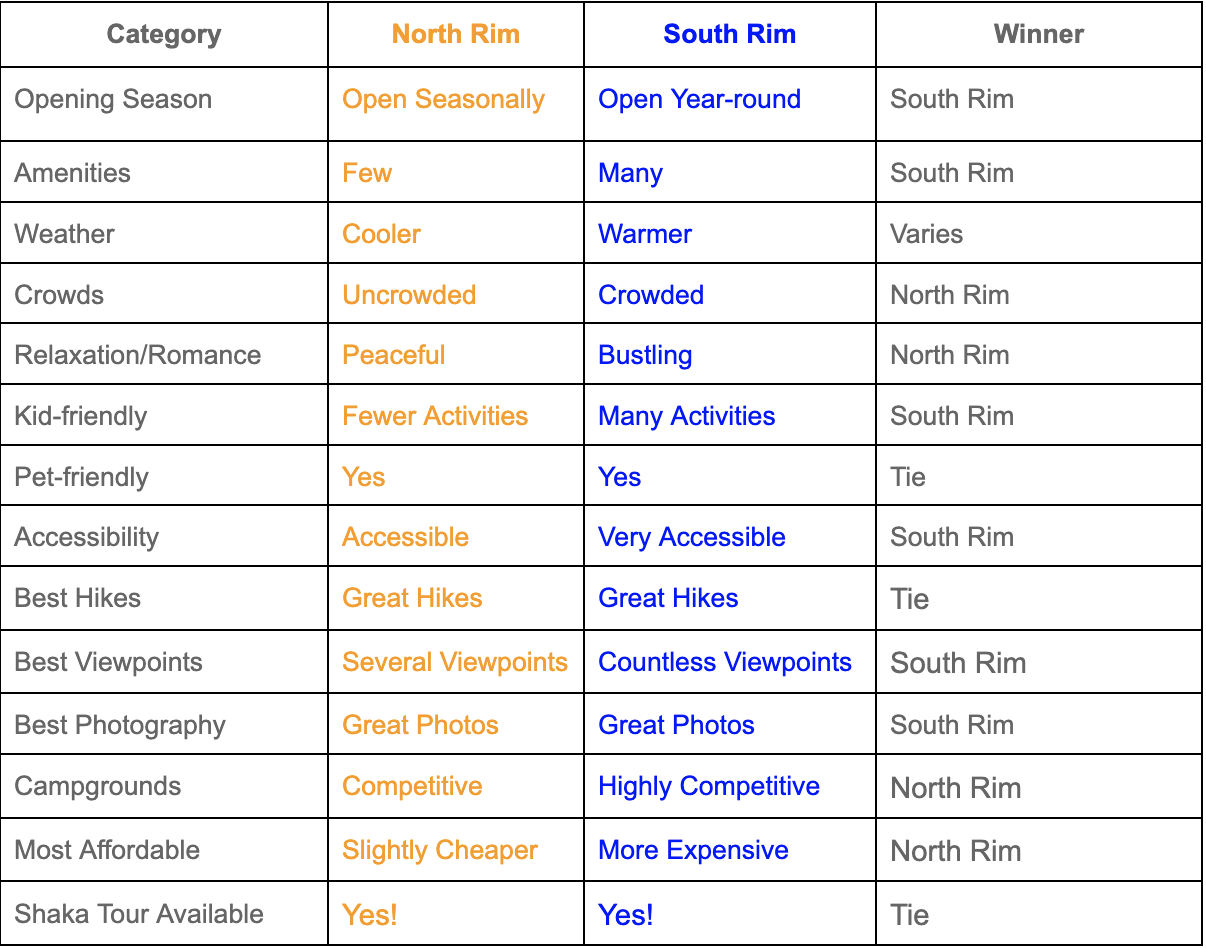
Whatever rim you decide to visit, you won’t be disappointed by a trip to the Grand Canyon. My number one recommendation? Make your trip the complete package with one (or both) of our amazing Shaka Guide Grand Canyon tours.
Like this article? Share it on Pinterest!
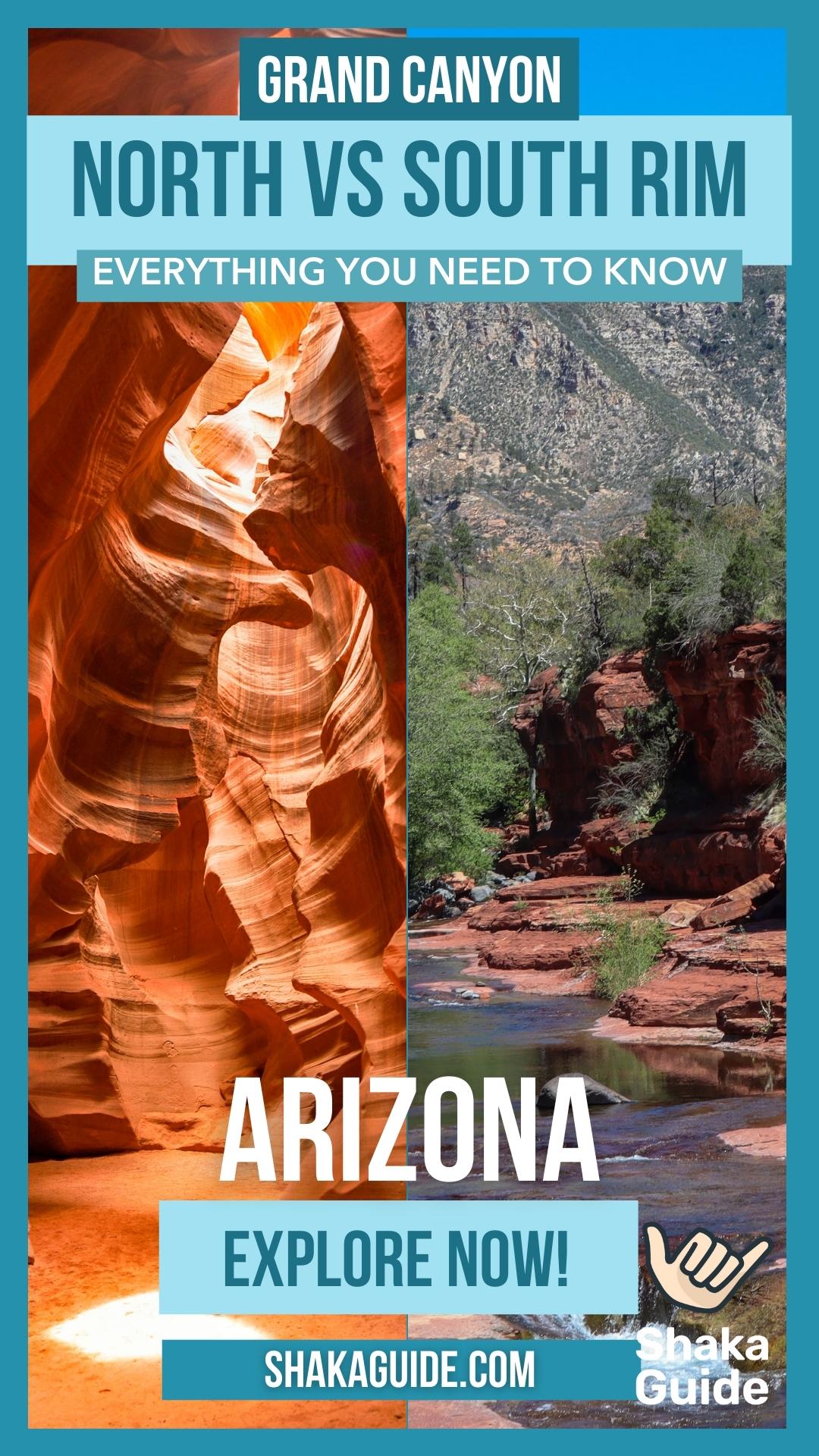
Want to learn even more about the north and south rims? Check out these recommended articles below.
The Best Views Grand Canyon South Rim
20 Things to Do at the Grand Canyon South Rim
Top 16 Grand Canyon South Rim Hikes

 Buy Gift Card
Buy Gift Card


